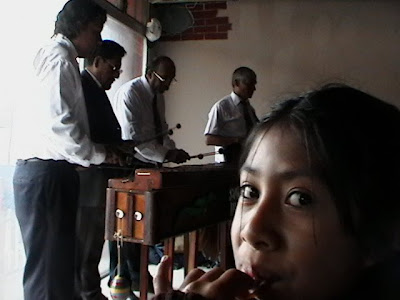"The young women are dancing," Juanita says. "We want to watch."
I assume she knows what the young women do there, and let them watch for a minute or so before uprooting them.
We're on our way back to the hotel after a dinner of Pollo Campero, Guatemala's highly successful chicken franchise. I'm not a fan of it at all, but eating there is a dream-come-true for them, so I willingly cough up $20 for bad food and societal and environmental degradation.
We stray a few blocks off course because I mistake 9th Avenue for 7th. At 10th Avenue I ask for directions. Most everyone you see is nice and trustworthy, though we bend our paths greatly to avoid obvious drunks and homeless people. I insist that Irma hold my hand because it's a bit scary out.
She has become much more of a daughter now; we spend lots of time together. I miss having little kids around, maybe as much as she misses having a father figure in her life, so we're much closer than you would think if you only heard our conversations. At the restaurant, she got silly. She's quite the clown, but rarely speaks in Spanish, mostly Tz'utujil, and her sisters get tired of translating, as most of her jokes consist of calling family members made-up names.
"El se llama Matitrux!" (His name is nonsense-word.)
But the eye-contact and the hugs and the trust say more than words could. We go to a shopping center called Tikal Futura which looks like it belongs in Miami. Before we're even inside, the group spots an escalator leading down to a parking garage. They roar with laughter. Juanita and I step on, her whole being shaking with fear and laughter. Irma and Ilda can't bear to get on. We run a hundred yards to the up-escalator, not wanting to leave them alone. This time Irma and I board the down-escalator. She squeezes my hand. I show her how to walk as the escalator moves. She's having more fun than most kids would have at a major amusement park. Ilda joins in later, and we go down yet another level. I introduce them to the elevator to go back up. I don't even feel it move as they scream at top volume.
Inside there is an arcade, and there are bumper cars, which are even more fun than the escalators. After two rides, we're off to shop. This is our second day in the city. The first day, we ate at a nice place with typical food and fantastic marimba music, then spent forever looking at shoes and clothes. I asked each one what they needed most, and made them wait when they thought they wanted something. "Think about it for a little while. If you buy that, you can't afford anything else." Everyone completed their shopping on the first day except Juanita. She understands deferred gratification better than the others -- in fact, the shopping was completed in ascending order of age. At the mall, she's the only one with shopping left to do, and we go into a dozen shoe stores. She always grabs displays and tries them on and says they're too small, and I tell her repeatedly to look for the style you like and ask to try it on in her size.
She's very smart in her way, but can't read an analog clock. She's shy, but nowhere near as shy as her sisters. I only have to prod her a little to get her to communicate what she wants to the salespeople. At Pollo Campero I manage to convince Ilda to ask the waitress for what she wants. It shouldn't be hard to ask for your favorite food. But several times over the weekend I think I have done the same with Irma, and always at the last minute she covers her face and says "Ild!" and her sisters fill in for her.
Sunday morning we go to the heart of Zone One, and there are severall parades. Our goal is to see where the president lives and to eat normal food with lots of tortillas, which we find. (Actually, I don't know if Colom lives there or not, but I've seen him up close twice and he's no big deal!) I teach them how to blow soap bubbles and they stare at helium balloons and cheap toys and dolls, asking for most of them "for Tono."
We board the bus at the CENMA, ready for the 3 hour ride home. It's due to leave at 2:30. I ask if anyone needs to use the bathroom. They don't so I go alone and buy a Prensa Libre and head outside to find Juanita a coke, as she is sure she will vomit without it.
On my way back in I see a young man lying with his head on a rock, convulsing, apparently from a drug overdose. He has bleached hair and close-cropped facial hair. He looks like a gangster and looks like he might be dying. Everyone walks past. So do I. I don't know the systems work here. You get hardened to death and tragedy here. In the mall a little over an hour ago a donut saleswoman collapsed, and my adopted family members looked on with fascination. Another donut salesperson was the only one attending her for several minutes until others started to take interest. A woman in yellow slacks, maybe a doctor, looked like she knew what she was doing, and stooped down to give the trambling woman attention. Minutes later some firefighters were on the scene, and the carried the patient away on a stretcher. On our way into town the day before, on the Panamerican highway going through Mixco, our friend Aklax pulled over to let an ambulance with lights on get by. Minutes later it was two cars ahead of us, going ten or twenty kilometers per hour. No one else pulled over to let it by.
I get back in the bus at 2:25. Juanita and Irma need to go to the bathroom. A few minutes later, the driver turns on the engine and puts the bus in gear. I bolt out of my seat.
"Wait, a mother left her baby here with me!"
"I can't wait here, I have to pull outside. I'll wait there."
These girls have never been here before, and outside is far away, so I bolt off the bus and run towards the restroom. The bus attendant is running with the girls in my direction. All is well. He makes fun of them, says they were putting on makeup and looking in the mirror when he found them.







































